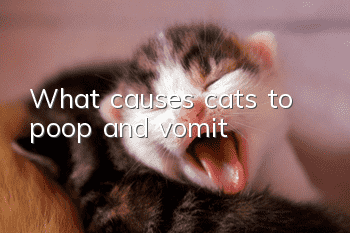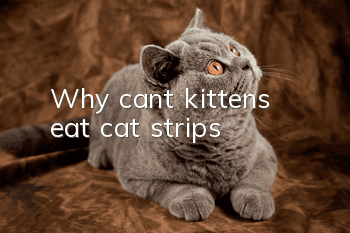What causes cats to poop and vomit?

It is abnormal for cats to have diarrhea and vomiting. Sudden change of cat food, gastrointestinal diseases, and viral enteritis may be the causes of cats' diarrhea and vomiting. If the kitten frequently vomits and has diarrhea before being vaccinated, it is It may be feline plague. It is recommended that the owner observe and record the vomitus and feces. Frequent vomiting and diarrhea within a day can easily cause severe dehydration and endanger life. It is necessary to communicate with the pet doctor in time. It is best not to self-medicate. If it is an adult cat and the vaccine is fully immunized, it may be common indigestion or bacterial enteritis
1. Sudden change of cat food
A sudden change of cat food brand is likely to cause gastrointestinal discomfort in the cat, and the cat cannot accept the new cat food ingredients for a while, resulting in adverse reactions, such as vomiting and diarrhea. . When owners change cat food brands or new canned snacks for their cats, they must make a transition, maintain the previous eating habits, and slowly change the food. You can refer to the "Seven-day Food Change Method". If this situation causes vomiting and diarrhea, the owner needs to fast for the cat for a day, and then assist the cat with probiotics to regulate the intestines. Follow the principle of eating small meals often and feed easily digestible food.
2. Gastrointestinal diseases
When cats suffer from gastrointestinal diseases, they will experience vomiting and diarrhea. Cats in this condition are in a poor mental state and may not eat or drink. If the gastrointestinal inflammation is severe, they may have bloody stools and watery stools. If it causes dehydration and collapse, it may be life-threatening. Since gastroenteritis may lead to serious consequences, it is recommended that the owner immediately seek medical treatment by a professional doctor, promptly replenish fluids, adjust the water and salt balance, and use antibiotics to eliminate inflammation.
3. Feline Distemper
Feline distemper, also known as feline panleukopenia, causes significant leukopenia, rapid onset and high mortality. The early obvious symptoms are elevated body temperature and frequent vomiting. and diarrhea, and some may also have blood in the stool. Cats in this situation are more dangerous. If you don't seize the opportunity for treatment, it can easily lead to death. If the owner observes that the cat suddenly vomits and has diarrhea, and the body temperature rises, he can suspect a viral infection and send him to the doctor in time. The course of cat distemper is about 7 days. After a week of treatment, the white blood cells will increase and the cat will have an appetite, and the cat will generally recover.
- How many hours should a cat normally sleep a day?
- What to do if your cat’s gums are red and swollen
- Are cats afraid of cucumbers? Are cats afraid of cucumbers?
- How to care for a cat with asthma?
- What medicine should I take if my cat has sticky drool?
- How long does it take for a frightened cat to recover from paralysis of its hind legs?
- Why does a cat meow like a child crying?
- How to feed a two-month-old kitten
- How to train a cat to obey what you say? To train a cat, you must first understand the cat!
- What should I do if my cat won’t eat or drink after being neutered?



